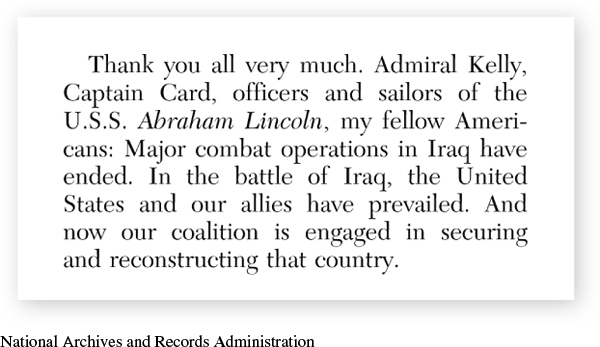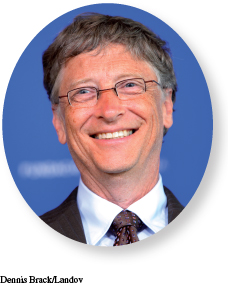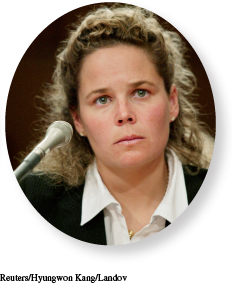Introduction to Chapter 29
29
The Challenges of a Globalized World
1993 to the present
WINDOW TO THE PAST
President Bush Declares Victory in Iraq, May 1, 2003

On May 1, 2003, in a speech to the American people President George W. Bush declared that the U.S. had prevailed in overthrowing the Iraqi dictator, Saddam Hussein. Although the work of reconstruction remained, the president proclaimed that combat operations had ended. However, his statement proved premature, as American forces remained fighting in Iraq for another eight years. To discover more about what this primary source can show us, see Document 29.2.
LEARNING OBJECTIVES
After reading this chapter you should be able to:
Assess the impact of computer technology, globalization, and immigration on the United States.
Evaluate President Clinton’s responses to domestic and global issues.
Explain the impact of the 9/11 attacks on President Bush’s foreign policy and describe his compassionate conservatism at home.
Discuss the reasons for Barack Obama’s election as president and explain the challenges that faced his administration.
AMERICAN HISTORIES

William Henry Gates III started tinkering with computers at age thirteen. In the late 1960s, computers were big, bulky machines that filled entire rooms. As a teenager in 1969, the enterprising Gates and some friends set up a business to make computerized traffic counters to gauge the speed of vehicles, for which they earned $20,000.
His brilliant mind and entrepreneurial inclinations led Gates to enroll at Harvard and then to drop out after spending more time at the university’s computer center than he did in class. In 1974 he became interested in microcomputers as an alternative to large conventional computers. A year later, Gates formed a computer software company called Microsoft, envisioning the microcomputer on office desktops and in homes throughout America.
Bill Gates succeeded beyond all expectations. In 1980 Microsoft collaborated with International Business Machines (IBM) to create a software package for IBM’s new line of personal computers. Microsoft quickly joined the financial boom and in 1986 became a publicly traded company on the New York Stock Exchange. Within a decade, Gates became the richest man in America, and like industrial titans a century earlier, he donated generously to fund philanthropic activities worldwide.

Despite the enormous benefits of computer technology, the digital revolution has also been used for malicious purposes. On September 11, 2001 (9/11), operatives from the international terrorist network al-Qaeda, who communicated through e-mail and cell phones and trained on computerized flight simulators, attacked the World Trade Center and the Pentagon. Kristen Breitweiser was a young housewife and mother living in suburban New Jersey on that fateful day. Her husband, Ron, a senior vice president at an investment management service, worked in Tower Two of the World Trade Center. When one of the planes commandeered by terrorists crashed into the building, her husband was killed, leaving her a widow with a two-year-old daughter. Breitweiser’s loss transformed her from a stay-at-home mother into a grieving victim and a political activist.
She started attending meetings of the Victim Compensation Fund established by the federal government following 9/11. She met Mindy Kleinberg, Lorie Van Auken, and Patty Casazza, other widows from New Jersey. The “Jersey Girls,” as they became known, addressed concerns over victims’ compensation but soon confronted larger political issues. In 2002 they successfully campaigned to pressure the White House and Congress to form a national commission to investigate how the 9/11 attacks could have happened and what the federal government might have done to prevent them.
The commission’s final report in 2004 disappointed Breitweiser. She called the report “hollow” and criticized President Bush for not fully and openly cooperating with the investigation. Although Breitweiser had voted for Bush in the 2000 election and considered herself a conservative, her rapid political education following 9/11 turned her against his candidacy in 2004. She also spoke out against the Iraq War, which the administration had initiated in 2003 in response to the 9/11 attacks.
The American histories of Bill Gates and Kristen Breitweiser were deeply affected by the twin forces of digital technology and terror that dominated life at the start of the twenty-first century. Computers, the Internet, and cell phone technology reformulated commerce and social relations, furthering the globalization that emerged after the Cold War. Google, the Web, Facebook, and Twitter became household words and broke down domestic and global barriers that earlier technologies had not penetrated. Computer technology revolutionized political communication and organization, mobilized ordinary citizens into action, and expanded opportunities for disgruntled and oppressed citizens of foreign countries to overthrow despotic rulers. Computers fostered the growth of big business mergers by allowing large companies to operate globally in quick and efficient fashion. To encourage international trade, the United States signed free trade agreements to open up foreign markets. Still, new technology posed unintended risks. Driven by new computer models for trading in financial securities, the stock market grew highly volatile, and downturns in the economy became greater in intensity and scope. At the same time, the 9/11 attacks placed the United States and its allies on a permanent war footing, resulting in wars against terrorism in Iraq and Afghanistan and increased surveillance of suspected terrorists and citizens alike. Amid these upheavals, Americans broke new ground by electing their first black president. Still, despite ending the Great Recession, passing health care legislation, extending marriage equality, and removing troops from Iraq, the nation faced historic burdens of racism and the increasing polarization of American politics.
Exploring American HistoriesPrinted Page 963
Exploring American Histories Value EditionPrinted Page 712
Chapter Timeline